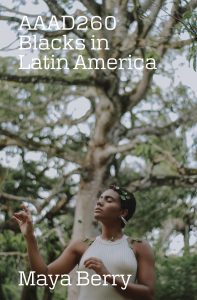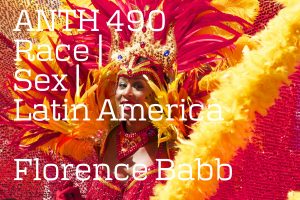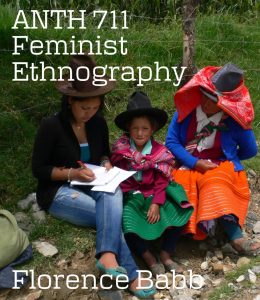Spring 2020
AAAD260: Blacks in Latin America
Dr. Maya Berry
 This course examines the development of African descendant communities in Latin America and the Caribbean. We will focus on the cultural, social, and political dimensions of slavery and race relations in countries such as Brazil, Colombia, Mexico, Nicaragua, and Cuba. Cuba will be highlighted as a unique case study to explore these dimensions in-depth. We will also explore the impact of nationalist ideologies on contemporary racial dynamics and the ways in which members of Afro-Latin communities have struggled for full citizenship and social justice. The course will conclude by looking at Afro-Latinx experiences in the U.S.
This course examines the development of African descendant communities in Latin America and the Caribbean. We will focus on the cultural, social, and political dimensions of slavery and race relations in countries such as Brazil, Colombia, Mexico, Nicaragua, and Cuba. Cuba will be highlighted as a unique case study to explore these dimensions in-depth. We will also explore the impact of nationalist ideologies on contemporary racial dynamics and the ways in which members of Afro-Latin communities have struggled for full citizenship and social justice. The course will conclude by looking at Afro-Latinx experiences in the U.S.
AAAD461: Race, Gender, & Activism in Cuba
Dr. Maya Berry
 The course is designed to give students a simulated experience of ethnographic fieldwork and qualitative research. Students are led through a learning experience where they will forge their own understanding of how a cross-section of Afro-Cubans, from different professional backgrounds and social spheres, are re-imaging political possibility in the contemporary moment when Cuba is “re-opening” for business. The incomplete realization of the state’s promise of full racial equality within the Cuban Republic since the 1959 Revolution have led Afro-Cubans to navigate the present era of reform in ways that draw on prior legacies of black activism while charting new territory. Thus, the course examines black activism in Cuba from historical and contemporary perspectives. How are Afro-Cubans mobilizing amidst the openings and limitations that have emerged in the new context of state-sponsored economic reforms and U.S.-Cuban rapprochement? To answer this central question, the course features a range of examples from Cuban society demonstrating a diversity of approaches. Situating the Cuban cases within ongoing Afrodescendant social movements in the Americas, we will explore how dynamics of race, gender, class, religion, and nation, shape strategies toward social change and visions of racial justice.
The course is designed to give students a simulated experience of ethnographic fieldwork and qualitative research. Students are led through a learning experience where they will forge their own understanding of how a cross-section of Afro-Cubans, from different professional backgrounds and social spheres, are re-imaging political possibility in the contemporary moment when Cuba is “re-opening” for business. The incomplete realization of the state’s promise of full racial equality within the Cuban Republic since the 1959 Revolution have led Afro-Cubans to navigate the present era of reform in ways that draw on prior legacies of black activism while charting new territory. Thus, the course examines black activism in Cuba from historical and contemporary perspectives. How are Afro-Cubans mobilizing amidst the openings and limitations that have emerged in the new context of state-sponsored economic reforms and U.S.-Cuban rapprochement? To answer this central question, the course features a range of examples from Cuban society demonstrating a diversity of approaches. Situating the Cuban cases within ongoing Afrodescendant social movements in the Americas, we will explore how dynamics of race, gender, class, religion, and nation, shape strategies toward social change and visions of racial justice.
Assignments are designed to practice core skills required in qualitative research: fieldnotes, formulation of research questions, identification and analysis of a variety of sources, interview design, and synthesis. Course material draws from both primary and secondary sources, texts from multiple disciplines, and multimedia objects of analysis.
ANTH 490: Race | Sex | Latin America
Dr. Florence Babb
 This course is intended for Anthropology majors completing their degrees. What can we learn by considering past and present differences of race, gender, and sexuality in Latin America and the Caribbean? What might this tell us about such a diverse region of the Americas, and even perhaps about our own forms of difference and inequality in North America? How might this exploration expand and transform our knowledge about this part of the world? We will consider how race, gender, and sexuality come together from precolonial to postcolonial and contemporary Latin America. We will explore histories of indigenous, Afrodescendant, and mestizo (mixed race) peoples and how racial and sexual differences have persisted or changed over time. To learn about the current context in the region, we will draw from selected case studies ranging from rural to urban settings, from Andean to tropical and coastal settings, from heteronormative to LGBTQ populations, and from conservative politics to social movements that are calling for expanded rights to political inclusion. We will ask why race, sex, and power are so often commingled in outsiders’ thinking about the Latin American and Caribbean region, and how this relates to such exoticized phenomena as Carnival and sex tourism. Students will be expected to read and discuss material in lively seminar formats and to take an active part in this seminar.
This course is intended for Anthropology majors completing their degrees. What can we learn by considering past and present differences of race, gender, and sexuality in Latin America and the Caribbean? What might this tell us about such a diverse region of the Americas, and even perhaps about our own forms of difference and inequality in North America? How might this exploration expand and transform our knowledge about this part of the world? We will consider how race, gender, and sexuality come together from precolonial to postcolonial and contemporary Latin America. We will explore histories of indigenous, Afrodescendant, and mestizo (mixed race) peoples and how racial and sexual differences have persisted or changed over time. To learn about the current context in the region, we will draw from selected case studies ranging from rural to urban settings, from Andean to tropical and coastal settings, from heteronormative to LGBTQ populations, and from conservative politics to social movements that are calling for expanded rights to political inclusion. We will ask why race, sex, and power are so often commingled in outsiders’ thinking about the Latin American and Caribbean region, and how this relates to such exoticized phenomena as Carnival and sex tourism. Students will be expected to read and discuss material in lively seminar formats and to take an active part in this seminar.
ANTH 711: Feminist Ethnography
Dr. Florence Babb
 This graduate seminar considers issues in qualitative research methodology through reading and discussing feminist ethnographies, critical assessments of feminist scholarship and methods, and related work. We ask challenging questions about the relation of gender to race, class, and sexuality, and about the dilemmas of field research, including the fundamental question of whether there is indeed a feminist ethnographic methodology. Moreover, we discuss the feminist politics of ethnographic representation (by the researcher depicting the researched) and of positionality (of the researcher in relation to the researched). Race is a fundamental aspect of all of these considerations in the seminar.
This graduate seminar considers issues in qualitative research methodology through reading and discussing feminist ethnographies, critical assessments of feminist scholarship and methods, and related work. We ask challenging questions about the relation of gender to race, class, and sexuality, and about the dilemmas of field research, including the fundamental question of whether there is indeed a feminist ethnographic methodology. Moreover, we discuss the feminist politics of ethnographic representation (by the researcher depicting the researched) and of positionality (of the researcher in relation to the researched). Race is a fundamental aspect of all of these considerations in the seminar.